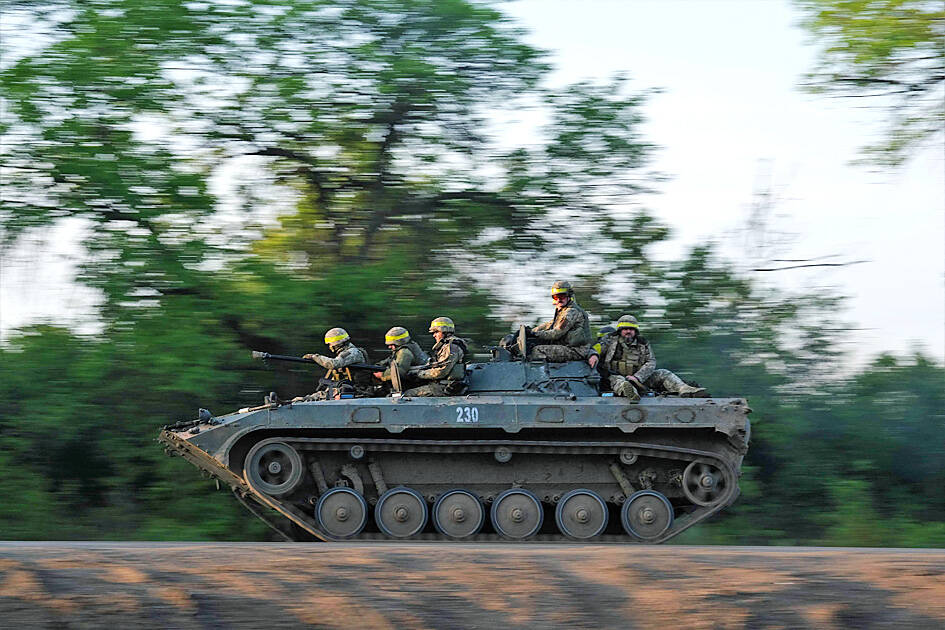Ukrainian President Volodymyr Zelenskiy yesterday said that Russian forces were not occupying Bakhmut, casting doubt on Moscow’s insistence that the eastern Ukrainian city had fallen.
Responding to a reporter’s question about the status of the city at the G7 summit in Japan, Zelenskiy said that “Bakhmut is not occupied by the Russian Federation as of today.”
“We are not throwing people [away] to die,” Zelenskiy said in Ukrainian through an interpreter. “People are the treasure. I clearly understand what is happening in Bakhmut. I cannot share with you the technical details of what is happening with our warriors.”

Photo: Reuters
The fog of war made it impossible to confirm the situation on the ground in the invasion’s longest battle, and a series of comments from Ukrainian and Russian officials added confusion to the matter.
Zelenskiy’s response in English to a question earlier at the summit about the status of Bakhmut suggested that he believed the city had fallen to Russian forces, and he offered solemn words about its fate.
When asked if the city was in Ukraine’s hands, Zelenskiy said: “I think no, but you have to — to understand that there is nothing, They’ve destroyed everything. There are no buildings. It’s a pity. It’s tragedy.”

Photo: AFP
“But, for today, Bakhmut is only in our hearts. There is nothing on this place, so — just ground and — and a lot of dead Russians,” he said.
Zelenskiy’s press secretary later walked back those earlier comments.
Ukrainian defense and military officials said that fierce fighting was ongoing.
Ukrainian Deputy Minister of Defense Hanna Malyar went so far as to say that Ukrainian troops “took the city in a semi-encirclement.”
“The enemy failed to surround Bakhmut, and they lost part of the dominant heights around the city,” Malyar said. “That is, the advance of our troops in the suburbs along the flanks, which is still ongoing, greatly complicates the enemy’s presence in Bakhmut.”
The spokesman for Ukraine’s Eastern Group of Forces, Serhii Cherevaty, said that the Ukrainian military is managing to hold positions in the vicinity of Bakhmut.
“The president correctly said that the city has, in fact, been razed to the ground. The enemy is being destroyed every day by massive artillery and aviation strikes, and our units report that the situation is extremely difficult,” he said.
“Our military keep fortifications and several premises in the southwestern part of the city. Heavy fighting is under way,” he said.
It was only the latest flip-flopping of the situation in Bakhmut after eight months of intense fighting.
Hours earlier, Russian state news agencies reported that Russian President Vladimir Putin congratulated “Wagner assault detachments, as well as all servicemen of the Russian Armed Forces units, who provided them with the necessary support and flank protection, on the completion of the operation to liberate Artyomovsk,” which is Bakhmut’s Soviet-era name.
The Russian Ministry of Defense also said that Wagner and military units “completed the liberation” of Bakhmut.
In Japan, Zelenskiy stood with US President Joe Biden during a news conference, as Biden announced US$375 million more in aid for Ukraine, which included more ammunition, artillery and vehicles.

A Chinese aircraft carrier group entered Japan’s economic waters over the weekend, before exiting to conduct drills involving fighter jets, the Japanese Ministry of Defense said yesterday. The Liaoning aircraft carrier, two missile destroyers and one fast combat supply ship sailed about 300km southwest of Japan’s easternmost island of Minamitori on Saturday, a ministry statement said. It was the first time a Chinese aircraft carrier had entered that part of Japan’s exclusive economic zone (EEZ), a ministry spokesman said. “We think the Chinese military is trying to improve its operational capability and ability to conduct operations in distant areas,” the spokesman said. China’s growing

Nine retired generals from Taiwan, Japan and the US have been invited to participate in a tabletop exercise hosted by the Taipei School of Economics and Political Science Foundation tomorrow and Wednesday that simulates a potential Chinese invasion of Taiwan in 2030, the foundation said yesterday. The five retired Taiwanese generals would include retired admiral Lee Hsi-min (李喜明), joined by retired US Navy admiral Michael Mullen and former chief of staff of the Japan Self-Defense Forces general Shigeru Iwasaki, it said. The simulation aims to offer strategic insights into regional security and peace in the Taiwan Strait, it added. Foundation chair Huang Huang-hsiung

PUBLIC WARNING: The two students had been tricked into going to Hong Kong for a ‘high-paying’ job, which sent them to a scam center in Cambodia Police warned the public not to trust job advertisements touting high pay abroad following the return of two college students over the weekend who had been trafficked and forced to work at a cyberscam center in Cambodia. The two victims, surnamed Lee (李), 18, and Lin (林), 19, were interviewed by police after landing in Taiwan on Saturday. Taichung’s Chingshui Police Precinct said in a statement yesterday that the two students are good friends, and Lin had suspended her studies after seeing the ad promising good pay to work in Hong Kong. Lee’s grandfather on Thursday reported to police that Lee had sent

BUILDUP: US General Dan Caine said Chinese military maneuvers are not routine exercises, but instead are ‘rehearsals for a forced unification’ with Taiwan China poses an increasingly aggressive threat to the US and deterring Beijing is the Pentagon’s top regional priority amid its rapid military buildup and invasion drills near Taiwan, US Secretary of Defense Pete Hegseth said on Tuesday. “Our pacing threat is communist China,” Hegseth told the US House of Representatives Appropriations Subcommittee on Defense during an oversight hearing with US General Dan Caine, chairman of the Joint Chiefs of Staff. “Beijing is preparing for war in the Indo-Pacific as part of its broader strategy to dominate that region and then the world,” Hegseth said, adding that if it succeeds, it could derail